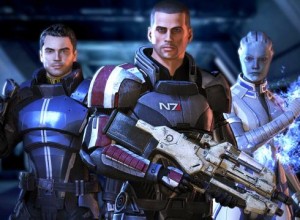I invited a couple of Mass Effect fans to reflect on our initial playthroughs of Mass Effect 3 together in real time, to be posted in a couple three installments. We invite you to come and revel in our luminous insights and trenchant bon mots! Marvel at our many euphemisms for space genitalia! Watch me make feeble stabs at appearing objective in critiquing the game series that has held us by the nerd short hairs* lo these last 5 years!
Al Schwartz: I had to exchange my Xbox for a functional one last night, which sucked. But tonight I’ve been rewarded by half of my crew going on a bender. Apparently emboldened by my tying another one on with Chakwas, Thick Vanbarrel got Ashley hammered, and for all of the series admirable attempts at drawing me into the role-playing experience, I don’t think I’ve ever felt my Shephard was channeling my own personality as purely as when he was harassing the hungover mess of a friend he found laying under a game table.
But drunk Tali was even better. “Eeeemerrrrgancy indushion port…”
If you guys didn’t go below and catch her drunk-dialing Javik afterward, you totally missed out.
Trevor La Pay: My guys never got drunk! I think it’s because my Tali killed herself. 🙁
.
I love that Shepard bites it in the end, though. More games should offer that kind of closure. I also like that the mass relays were destroyed, as it adds finality to the series. More games should tell complete stories with a clearly defined endpoint.
Everything with the Catalyst is awful, though.
Still, fuck the people who call up their congressman or the FTC or whoever in an attempt tom lobby BioWare to change it. Creators should have full responsibility to end their stories however they like. People are so dumb.
That said, there seem to be four camps of people on the Internet re: the ending (ESP on Facebook)
1) The ending is an abomination and should be changed by BIoWare! The horror! 1/10!!!1!
2) The ending was lame, but it was still a decent game. 8/10
3) I loved the ending, and the game was pretty good, too. 8/10
4) The whole game was the ending! Fanboys are so terrible! This was a masterpiece and naysayers are virgins who live with their moms!2!!!! 10/10
As usual, there’s the backlash against the game, and then there’s the backlash against the backlash. I’m in number two, and I’d wager that most people who play this are in number two or three. The Internet is choked with ones and fours, though.
This brings me to a question: why is it still so rare for people to acknowledge flaws in the things they like, or to like things that have noticeable flaws?

"Who” and “whoever” are subjective pronouns, while “whom” and “whomever” are in the objective case, fleshbag.
But I digress. I don’t think I have a problem acknowledging flaws in things I like, Mass Effect included, so I’m not sure I can speak to why other people get so worked up about doing so without sounding presumptuous and condescending about the problems I’m too matoor to have. So I’ll try to stick to your specific points. And I disagree about the Catalyst. For one, it’s not entirely a new character dropping in out of nowhere so much as one that we knew existed but doesn’t get named until the last ten minutes. I mean, we knew the Reapers had a guiding intelligence behind their actions, and I was certainly expecting to confront it in the finale. For another, it doesn’t solve the problem for the hero or come out of nowhere. We were building the Crucible the entire game for the express purpose of wiping out the Reapers with some sort of galaxy-wide magic field, the only twist was the exact nature of that field depending on your choice. That doesn’t mean it’s particularly clever or terrific in how it’s written, but that I don’t think it is technically a deus ex machina.
Honestly, the Catalyst’s motivations are not particularly well spelled out, but it makes more sense if you view it as the final attempt to indoctrinate Shephard. Which is how I like to see it, although the way the control/synthesis endings play out make it seem like it was telling the truth about everything. That’s where things get really problematic, and my superpower to ignore the bits I don’t like and fill in the blanks on my own comes in handy.

A: We always knew that the Reapers were intelligent and acting in concert, so of course we knew there would be someone/thing giving them their marching orders. Probably their designer, but at least some “head” Reaper like Harbinger. You say the Reapers were presented as an unknowable hivemind force with near infinite intelligence; the Catalyst is that intelligence. It IS the Reapers.
Or something. Personally, I find the whole thing more palatable viewing the Catalyst as Harbinger taking on a form that Shephard won’t immediately tell to fuck itself as a last stab at diverting him from wiping the Reapers out. Here’s how I broke down the options in the moment:
Destroy: This is what I came to do, what has been Shephard’s goal over the entire series. I’ll need a damn good reason to change course now. I have to kill the Geth and EDI to do it? Shit. I just spent all this effort reintegrating the Geth into galactic society, and EDI’s got a sexy voice. There’s got to be a better way.
Synthesis: This was the most out-there, wonky sci-fi option, and I had a certain desire to pick it on that basis alone. But I quickly discarded it as 1) a hybrid organic/synthetic lifeform is basically a Reaper (or just a husk), and 2) even if I thought this was a positive step forward in evolution, overwriting the DNA of every person in the galaxy without their consent is, imo, much more monstrous than sacrificing one race of beings to save a dozen others. No way.
Control: This one is all gravy. I get to end the war without sacrificing anyone else, and I even get to live on, albeit in a new, more Lovecraftian form. It’s all upside, and it even has the paragon blue coloring to let me know that it’s what the good guy should do.
Except…I just shot the Illusive Man for trying to do exactly this. Yes, he was indoctrinated and Shephard isn’t because he’s special and this little glowing incarnation of my guilty conscience just assured me so. Saren and the IM both thought they were special and only lesser beings could be manipulated in this way, but I had to smack them both (and also one BIG STUPID JELLLYFISH) upside the head and tell them that no, they were just as weak and susceptible to corruption as the rest of us. The rule throughout the series had been that once you started thinking you could work with the Reapers, you were already lost.
So that brought me back to Destroy as the only option. It felt fitting that after (more or less) single-handedly leading the charge to defy millions upon millions of years of history and the will of the Machine Gods of Death, after beating the odds over and over again, my Shephard’s last test was against his own ego. To see if he had the humility to acknowledge that he probably wasn’t the only organic being in history that could control the machines that control people. And also the strength not to let the guilt over all the people that he couldn’t save throughout the series, like the little boy that’s whispering in my ear about the lovely options behind doors 2 and 3, stop him from making one more difficult decision, i.e. to sacrifice the new form of life that I had been largely responsible for ushering into the world.
So that was my ending. My Shephard completed his mission and died (again) having learned from his experiences that he was a man like any other, and the only thing that really separated him from other soldiers was the knowledge that you can’t save everyone, and the ability to make decisions without being paralyzed by it, which he developed from Akuze to Virmire to the Citadel to the Collector Base and back to Earth. It was a fine ending, an appropriate ending and the one that I will carry around in my head when I think of the series in the future.
Buuuut it all falls apart when you look at the other ending scenarios. Then it appears that the Catalyst was telling the truth about everything, that Shephard really was just too special to be indoctrinated and controlling the Reapers really does save the day without the need to sacrifice anyone. And that overwriting the DNA of every person in the galaxy doesn’t change them in any noticeable or unpleasant way. Then you have to take the Catalyst’s stated motivations at face value and try to make sense of them, which as you point out is not easy.
So the Ending as a whole is a mess, but despite it all there is an ending that slipped through that works for me and my Shephard. That was mainly what I needed the game to do, so overall I’m pretty happy with it, although I would feel obligated to grade it down for what a mess the other options are if I were reviewing it in some professional capacity.
Up Next: The dramatic conclusion.



